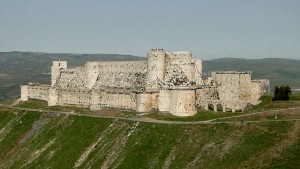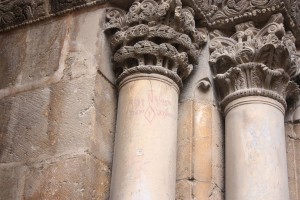Whenever a Christian suggests that morality is impossible without God, or that Christianity might have been beneficial for society, some secularist will reflexively object that the Crusades have demonstrated that this cannot be so. Put aside the fact that no-one is seriously contending that everything done in the name of Christ is true to his message. Never-mind that the Christian was merely arguing that theism offers the best explanation of moral facts, and not that there can be no morality without the Church. It is just too easy to portray the Crusaders as mediaeval Nazi’s. Consider Steven Pinker’s historical analysis:
Crusader armies were mobilised to fight a “just war” to retake Jerusalem form Muslim Turks, earning them remission of sins and a ticket to heaven. They massacred Jewish communities on the way, and after besieging and sacking Nicea, Antioch, Jerusalem and Constantinople, they slaughtered their Muslim and Jewish populations. Rummel estimates the death toll at 1 million. The world had around 400 million people at the time, about a sixth of the number in the mid-20th century, so the death toll of the Crusader massacres as a proportion of the world’s population would today come out at around 6 million, equivalent to the Nazi’s genocide of the Jews (The Better Angels of Our Nature, p.140).
There are several problems here, none of them minor. Set aside the fact that Pope Urban II had to abandon just war theory to defend his vision of a Holy War. In the above passage, Pinker conflates the “People’s Crusade” led by Peter the Hermit, the First Crusade and the Fourth Crusade. This gives the impression that the First Crusade was a murderous, bloodthirsty hoard bent on nothing short of genocide. We need not approve of the means and ends of the Crusaders to point out that this is little more than a caricature. The Crusaders were brutal, and often callous, warriors – so were their opponents and allies – but they were not 11th Century Nazis.
By comparing the Crusaders to Nazi’s, Pinker gives the impression that the death toll of the crusades was made up entirely of the Crusader’s victims. In fact, Crusading was extremely hazardous to one’s health. As many as a third of the aristocrats who set out on Crusade, and 80% of their followers, never returned (Christopher Tyerman, The Crusades: A Very Brief Introduction, p.103). It remains very difficult to give a good estimate of deaths caused in battle, however, because logistical difficulties caused many deaths through starvation; civilians tended to flee from cities and towns in the paths of the opposing armies; and armies on both sides suffered from high rates of desertion.
Pinker’s estimate of 1 million dead is based on a figure given by the political scientist RJ Rummel; Rummel’s methodology is not explained. In any case, this estimate seems exaggerated and unsound. In his acclaimed history The Crusades Thomas Asbridge explains the difficulties historians have estimating the numbers involved in the Crusades “primarily because of the unreliability of wildly inflated contemporary estimates” (p.42).
Consider the fall of Jerusalem to the first Crusade in 1099. Asbridge acknowledges that the historical sources force us to “…acknowledge the terrible inhumanity of the Crusader’s sadistic butchery” (p.102). However, he also sounds a note of caution. Both Crusaders and Muslims sought to exaggerate the extent of the slaughter: Muslims to portray the Crusaders as barbarians, the Crusaders to consolidate their image as God’s avenging warriors. Muslim sources put the number of dead at 70 000; Latin sources estimated 10 000. However,
..recent research has uncovered close contemporary Hebrew testimony which indicates that casualties may not have exceeded 3000, and that large numbers of prisoners were taken when Jerusalem fell. This suggests that, even in the Middle Ages, the image of the crusaders brutality in 1099 was subject to hyperbole and manipulation on both sides of the divide ( p. 102).
Friend and foe alike had good reason to exaggerate the extent of the slaughter in Jerusalem. When Raymond of Aguilers wrote “that in the Temple of Solomon and the portico crusaders rode in blood to the knees and bridles of their horses” he was using the language of the book of Revelation to justify the crusade. His account is hyperbolic and it would be foolish to use it to reconstruct the extent of the massacre.
So the Crusaders were not quite the genocidal maniacs of popular imagination; yet they were often barbarous and always lethal. At the battle of Dorylaeum in 1097 the vanguard of a Crusader army was ambushed by ten thousand Turkish horsemen. Heavily outnumbered and completely outmanoeuvred, the indomitable Norman knight Bohemund rallied his troops with the first health and wealth sermon on public record:
“Stand fast all together, trusting in Christ and in the victory of the Holy Cross. Today, please God, you will all gain much booty.”
Bohemund seems to have disastrously misunderstood Jesus’ call to “take up your Cross”. Christians in earlier and later centuries would find it blasphemous to think that Christ died so that Frankish knights could turn a healthy profit on a military campaign. Yet he was sent on his way by a Pope, and in a later century even the great Bernard of Clairvaux would send kings and lords on a penitential holy wars to extend the borders of Christendom. Arguably, the Crusades establish that even orthodox Christian beliefs can be dangerous.
We need to be careful here. The mere fact of religious difference between Muslims and Christians was not sufficient to bring about armed conflict. The Crusaders sought to liberate and defend territory which had been conquered by Seljuk Turks; they were not on a quest to eliminate the religion of Islam. Indeed, they were quite willing to make political deals with Muslim rulers, including the Egyptian Fatimids. So what caused the Holy War?
Some apologists have argued that the Crusades were a purely defensive war. This seems ill-advised. As Christopher Tyerman notes in God’s War, Urban’s “vision was more radical, more penetrating and more disturbing” (p. 74). True, the Byzantine Empire had suffered many losses to the Seljuk Turks in the 11th Century; yet there was no existential threat to Western Europe when the first Crusade was launched. Indeed, compared to the 1070’s when no army was sent to defend Christendom in the East, the threat had substantially lessened by the 1090’s. And it made no sense to defend Byzantium by launching a long and dangerous campaign to Jerusalem.
Pope Urban II told the Christians of Western Europe that God would not only permit but spiritually reward anyone who fought to free the Holy land. For centuries, Christian theologians had reluctantly allowed that war was sometimes a necessary evil which might be permitted in defence of the weak and innocent. The Pope went much further; he argued that one form of bloodshed could be an absolute good. In effect, hating Christ’s enemies became virtuous; Christians could take up a cross to nail their enemies to it. Not only would they be rewarded by remission from penance; Urban offered remission from sin. So Frankish nobles could sate their appetite for destruction, gain a clear conscience and earn a noble reputation in one fell swoop.
Historians can dispute the number slain when the First Crusade finally entered Jerusalem; but there can be little doubt that children and babies were torn from their mother’s arms and hacked to pieces.
A group of Muslims on the roof of the Temple of Solomon surrendered, only to be killed soon afterwards. Women and children were not spared in this brutal orgy of destruction…the horror of these events has left an indelible stain on Muslim-Christian relations down through the centuries. (Jonathan Phillips, Holy Warriors, p.26).
When they had finished the Crusaders turned to worship God in the “Holy City”; the clergy accompanying the Crusaders persuaded the merciless that they had inherited the Kingdom of God. We should not be surprised. After all, Crusading had been declared an ‘act of penance’ by the Pope himself. This brings us to the true, spiritual danger of religion. The true danger of religion is that it can become religiosity; and the danger of religiosity is that we forget we are fallen creatures, prone to whitewash even our darkest desires.
It is too easy to bury the lessons of the Christian gospel under creeds and rituals. The Crusaders believed that their beliefs and acts of devotion had atoned for all their sins; yet the apostle Paul explicitly states that such deeds can justify no-one. Paul and the prophets make it clear that God prefers mercy to sacrifice; Jesus made it clear that even the devout require forgiveness and that no-one can enter the Kingdom without being transformed by Him. Jesus and his apostles taught that the citizens of the Kingdom should be characterised by patience, mercy, forgiveness, gentleness, self-control, compassion and kindness.
But are we any less benighted in our secular age? If the atrocities of the 20th Century are the bloodiest on record moderns would be ill advised to look on their ancestors with contempt. We humans cannot decide if we will worship; we can only decide what we will worship. Our spiritual needs are as basic as our hunger for food and sex. If we do not worship God, we will find something else to adore. Once we bowed down to stones and beasts; lacking the poetry of the ancients, today we are more inclined to deify political ideals and social causes. Such programmes can become dangerous if they will not respect any authority beyond human reason and creativity. So secular ideologies, and the complacency of the decadent, have led to mass-produced carnage.
So, all other things being equal, a Christian worldview should be a help to society, not a hindrance; Christian witness will heal, not harm. But, all too often, all other things are not equal. We want to justify ourselves in our own eyes, and religion can be a helpful means to that end. We forget that James reminded his readers that the devil’s theology is impeccably orthodox; we ignore Paul’s teaching that almsgiving and martyrdom are worthless if we don’t have love. We can behave religiously and confess the truth; but this means nothing is the truth has not broken our hearts. Jesus’ gospel is for religious paupers: those who realise that they are not holy as God is Holy; for those who acknowledge that they are completely dependent on God’s mercy.

